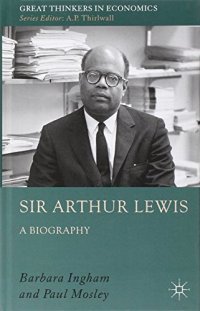
Ebook: Sir Arthur Lewis: A Biography
Author: Paul Mosley Barbara Ingham
- Genre: Economy
- Tags: Business Professionals Academics Biographies Memoirs Development Growth Economics Money Economic Conditions History Theory Caribbean West Indies Antigua Bahamas Barbados Cuba Dominica Dominican Republic Grenada Haiti Jamaica Saint Kitts Lucia Vincent Trinidad and Tobago Americas World Civilization Culture Expeditions Discoveries Jewish Religious Slavery Emancipation Women in Latin American International Politics Government Social Sciences Political Economy Specific Topics Finance New Used Rental
- Series: Great Thinkers in Economics
- Year: 2013
- Publisher: Palgrave Macmillan
- Language: English
- pdf
Why are poor countries poor? How can they get out of the poverty trap?
Sir Arthur Lewis (1915-1991) was the first person to answer these questions in a systematic way. But he was much more than this; he was also the first Afro-Caribbean to be a professor at a British university, and the first black man to win the Nobel Prize for Economics. He had to fight against prejudice, in a way which for us, the best part of a century later ,is hard to imagine.
Lewis was also more than an academic economist. He believed 'that economics 'concerns life more than numbers', and wrote in a simple style, accessible to all. In Africa, the West Indies and Moss Side (Manchester) in the 1950s and early 1960s, side by side with his academic work, he was also working as an activist to try and achieve a fair deal for the poor. But those attempts ended in frustration, and he was astonished to be awarded the Nobel Prize, in 1979, when he thought he had been forgotten.
Barbara Ingham and Paul Mosley's biography describes the man, and the social relationships, behind these astonishing achievements. Although Lewis liked to present himself as a rational individualist who worked his way up by himself, both the ladders he managed to climb, and the snakes he often slipped down, cannot be understood without considering Lewis' friendships, rivalries and the structures of the societies in which he attempted, sometimes happily and sometimes disastrously, to intervene.
Sir Arthur Lewis (1915-1991) was the first person to answer these questions in a systematic way. But he was much more than this; he was also the first Afro-Caribbean to be a professor at a British university, and the first black man to win the Nobel Prize for Economics. He had to fight against prejudice, in a way which for us, the best part of a century later ,is hard to imagine.
Lewis was also more than an academic economist. He believed 'that economics 'concerns life more than numbers', and wrote in a simple style, accessible to all. In Africa, the West Indies and Moss Side (Manchester) in the 1950s and early 1960s, side by side with his academic work, he was also working as an activist to try and achieve a fair deal for the poor. But those attempts ended in frustration, and he was astonished to be awarded the Nobel Prize, in 1979, when he thought he had been forgotten.
Barbara Ingham and Paul Mosley's biography describes the man, and the social relationships, behind these astonishing achievements. Although Lewis liked to present himself as a rational individualist who worked his way up by himself, both the ladders he managed to climb, and the snakes he often slipped down, cannot be understood without considering Lewis' friendships, rivalries and the structures of the societies in which he attempted, sometimes happily and sometimes disastrously, to intervene.
Download the book Sir Arthur Lewis: A Biography for free or read online
Continue reading on any device:

Last viewed books
Related books
{related-news}
Comments (0)